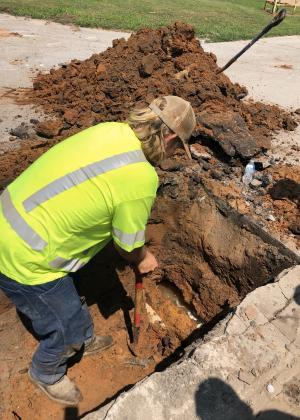The Chickasha Municipal Authority has requested additional funding from the state Commerce Department to finance a waterline improvement project that would cost more than half a million dollars.
The CMA solicited bids on a project to:
• Construct a new water main along Missouri Avenue between Third and Fourth streets.
• Build a new water main along Virginia and Henderson from Shepherd to Tennessee; and
• Install new fire hydrants to replace antiquated and non-standard hydrants and shutoff valves in the area bounded by Alabama and Missouri between Second Street and Henderson Street.
The new mains are needed to complete loops in the city’s water distribution system, which would “aid in improving water quality and fire suppression flow volumes,” consulting engineer R. Scott Vaughn said.
The valves would enable sections of the water distribution system to be isolated, “thereby alleviating the need to place several blocks of customers out of service during maintenance and repairs,” Vaughn explained.
Three bids for the work were received and opened June 1. The Municipal Authority voted June 20 to award a $568,304 contract on the Water Distribution Improvements project to the low bidder, Marsau Enterprises of Enid, “subject to availability of funding.”
The original construction budget was $330,771, which would have been financed mostly if not entirely from a community development block grant awarded by the state Commerce Department. However, that calculation “is now a year old,” Mayor Chris Mosley said. It also leaves a funding deficit of $237,533.
“After looking at all options, we are asking for additional community development block grant funds” to finance the project, Mosley wrote in a June 2 letter to Robin Slawson, project manager of the Commerce Department’s Community & Economic Development Team.
The CMA also voted June 20 to chip in $25,000 and “would like to contribute more but we are not financially able to put in more money,” Mosley advised Slawson. In fact, the $25,000 “will be taken from our operating budget,” he said.
The city already has “$1.5 million in various other projects that are assigned and underway,” Mosley wrote. The city also still owes $1,445,000 on a 2014 revenue bond issue that financed repairs to the water treatment plant, according to Robert Brooks, the city’s comptroller.
Federal CARES Act and ARPA funds the City of Chickasha received “are already committed and assigned to other projects,” Mosley informed Slawson.
“We have some serious issues with our water infrastructure,” City Manager Keith Johnson said. “We’re at risk of not being able” to meet demands imposed on the water delivery system. The water treatment plant has several “deficiencies” because of its age, deteriorating condition, and changes in treatment processes in the last six decades, he told the council recently.
The town’s existing treatment plant was built in the 1960s. It was designed to produce 6 million gallons of potable water each day but now “provides a maximum of 4.6 million gallons daily” to Chickasha and the nearby community of Norge, Johnson said.
The Chickasha Municipal Authority proposes a new water treatment plant that would be capable of producing up to 6 million gallons of potable water daily “with provisions to expand to 8 mgd.”
The city has requested a $70 million loan from the Oklahoma Water Resources Board to pay for construction of a new and bigger water treatment plant. “We are working on getting it on our July 18 Board agenda for consideration,” Joe Freeman, chief of the state agency’s Financial Assistance Division, told Southwest Ledger on June 21.
The long-term loan would be retired with collections from a sales tax of 1.25% – a modest half-cent increase in an existing capital improvements sales tax of three-quarter of a penny per dollar – or, in the alternative, an 82% increase in water rates.
Chickasha voters will have an opportunity during a special election Aug. 8 to make their financing preference known.
The water treatment plant “is not the only capital project the City will be facing, and it is not financially feasible to take on any other debt at the present time,” Mosley told the Commerce Department. “We also have significant needs in the wastewater system and a large storm drainage project upcoming.”
Even after a double-digit increase in water rates last year, “It’s still not enough to cover the costs,” Johnson told the Ledger. With expenses exceeding revenues, coupled with the anticipated OWRB loan, “We are going through a thorough financial review and restructuring of Municipal Authority finances,” Mosley said.


